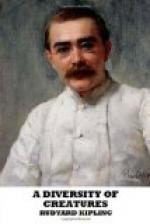Three years of M. Najdol’s preparations do not fit a man for many careers. His friends, who knew he did not drink, assumed that Conroy had strained his heart through valiant outdoor exercises, and Conroy had with some care invented an imaginary doctor, symptoms, and regimen, which he discussed with them and with his mother in Hereford. She maintained that he would grow out of it, and recommended nux vomica.
When at last Conroy faced a real doctor, it was, he hoped, to be saved from suicide by a strait-waistcoat. Yet Dr. Gilbert had but given him more drugs—a tonic, for instance, that would couple railway carnages—and had advised a night in the train. Not alone the horrors of a railway journey (for which a man who dare keep no servant must e’en pack, label, and address his own bag), but the necessity for holding himself in hand before a stranger ‘a little shaken in her nerves.’
He spent a long forenoon packing, because when he assembled and counted things his mind slid off to the hours that remained of the day before his night, and he found himself counting minutes aloud. At such times the injustice of his fate would drive him to revolts which no servant should witness, but on this evening Dr. Gilbert’s tonic held him fairly calm while he put up his patent razors.
Waterloo Station shook him into real life. The change for his ticket needed concentration, if only to prevent shillings and pence turning into minutes at the booking-office; and he spoke quickly to a porter about the disposition of his bag. The old 10.8 from Waterloo to the West was an all-night caravan that halted, in the interests of the milk traffic, at almost every station.
Dr. Gilbert stood by the door of the one composite corridor-coach; an older and stouter man behind him. ‘So glad you’re here!’ he cried. ’Let me get your ticket.’
‘Certainly not,’ Conroy answered. ’I got it myself—long ago. My bag’s in too,’ he added proudly.
‘I beg your pardon. Miss Henschil’s here. I’ll introduce you.’
‘But—but,’ he stammered—’think of the state I’m in. If anything happens I shall collapse.’
’Not you. You’d rise to the occasion like a bird. And as for the self-control you were talking of the other day’—Gilbert swung him round—’look!’
A young man in an ulster over a silk-faced frock-coat stood by the carriage window, weeping shamelessly.
‘Oh, but that’s only drink,’ Conroy said. ’I haven’t had one of my—my things since lunch.’
‘Excellent!’ said Gilbert. ’I knew I could depend on you. Come along. Wait for a minute, Chartres.’
A tall woman, veiled, sat by the far window. She bowed her head as the doctor murmured Conroy knew not what. Then he disappeared and the inspector came for tickets.
‘My maid—next compartment,’ she said slowly.
Conroy showed his ticket, but in returning it to the sleeve-pocket of his ulster the little silver Najdolene case slipped from his glove and fell to the floor. He snatched it up as the moving train flung him into his seat.




